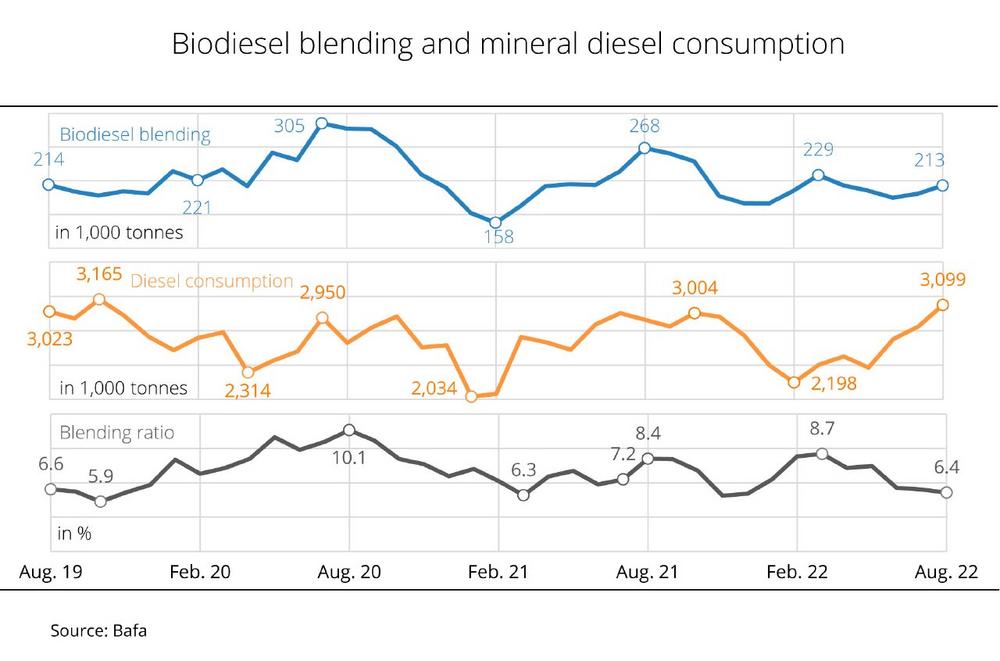In August 2022, 212,960 tonnes of biodiesel were used for blending, which was up 6.1 per cent on the previous month. Since at the same time, consumption of diesel rose 8.8 per cent to 3.1 million tonnes, hitting a three-year high, the incorporation rate declined 0.2 percentage points to 6.4 per cent. This was the lowest incorporation rate since the beginning of the year. In other words, total consumption of diesel and biodiesel in August amounted to just over 3.3 million tonnes, which was 3.7 per cent more than in August 2021. Biodiesel consumption in the running year totalled just over 1.6 million tonnes. The January to August 2022 incorporation rate averaged 7.2 per cent. This compares to 7.4 per cent in the year-ago period.
The Union zur Förderung von Oel- und Proteinpflanzen (UFOP) has pointed out that the standard for diesel fuel, DIN EN 590, places a cap on the percentage of biodiesel at 7 per cent by volume. The blending percentage exceeding this limit is hydrotreated vegetable oil (HVO). The association has contended that these volumes are still not listed by the Federal Office for Economic Affairs and Export (BAFA).
UFOP estimates biodiesel/HVO demand in the 2022 calender year to be slightly lower than in 2021, when the amount used was 2.53 million tonnes. The trend is towards a decline in demand for diesel and energy as a consequence of increasing e-mobility and the advancing energy efficiency associated with this type of powertrain.
In view of the current debate on the German government coalition’s Immediate Climate Action Programme and criticism from the government’s Expert Council on Climate Issues, the UFOP has emphasised that in 2030, the target year set out in the German Climate Change Act, more than 35 million vehicles will still be powered by combustion engines in Germany. The association is convinced that in order to meet the GHG quota obligation and emission requirements for traffic, the world needs any and all options without giving preference to any specific technology and that such options would include certified sustainable greenhouse gas-efficient biofuels from cultivated biomass, residues and wastes. Looking at products that do not need to meet requirements of the same standard, the UFOP has pointed out that proof of sustainability should be the "permit" to access the market and being granted credits towards the cap on GHG emissions.
The Union for the Promotion of Oil and Protein Plants e. V. (UFOP) represents the political interests of companies, associations and institutions involved in the production, processing and marketing of domestic oil and protein plants in national and international bodies. UFOP supports research to optimise agricultural production and for the development of new recycling opportunities in the food, non-food and feed sectors. UFOP public relations aim to promote the marketing of domestic oil and protein plant end products.
UFOP – Union zur Förderung von Oel- und Proteinpflanzen e.V.
Claire-Waldoff-Str. 7
10117 Berlin
Telefon: +49 (30) 2359799-40
Telefax: +49 (30) 2359799-99
http://www.ufop.de
GF
Telefon: +49 (30) 31904434
E-Mail: s.arens@ufop.de
Union zur Förderung von Oel- und Proteinpflanzen e
Telefon: +49 (30) 31904-434
Fax: +49 (30) 31904-485
E-Mail: m.leonhard@ufop.de
![]()

